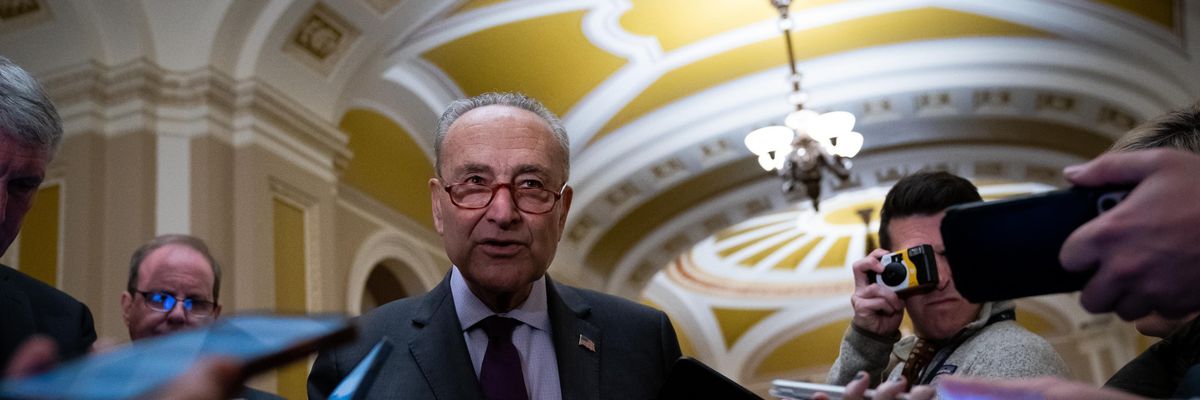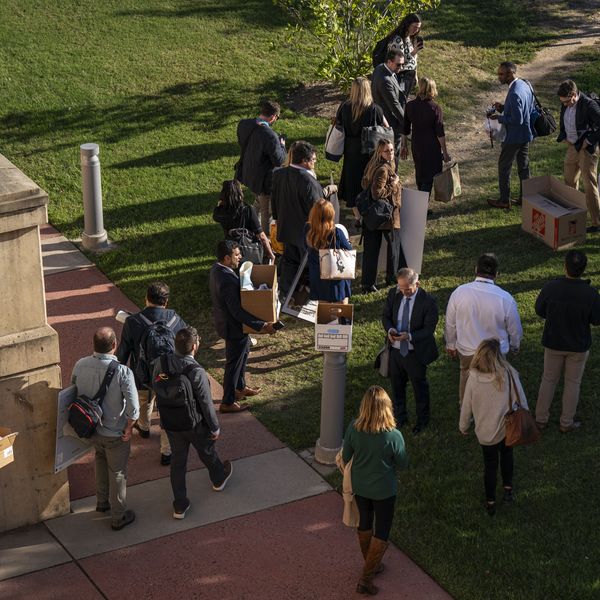
Senate Majority Leader Chuck Schumer (D-N.Y.) speaks to reporters after a meeting at the White House with congressional leaders and U.S. President Joe Biden on Capitol Hill in Washington, D.C. on November 29, 2022. (Photo: Elizabeth Frantz for The Washington Post via Getty Images)
Journalism Defenders Push for Passage of 'Game-Changing' PRESS Act
"The PRESS Act is the most important free press legislation in modern times because it would finally stop the government from spying on journalists and threatening them with arrest for doing their jobs," explained one advocate.
Free press advocates this week urged people to contact Senate Majority Leader Chuck Schumer's office and ask the New York Democrat to pass legislation protecting journalists from government abuses during the closing days of the current Congress.
"Now is crunch time to make the PRESS Act the law of the land before this Congress adjourns."
"The time between an election and the inauguration of a new Congress--or the lame-duck, as it is affectionately known--is ironically a time when things can happen on the Hill, in part because departing members don't have to worry about reelection," Emily Hockett, a Technology Press Freedom Project fellow, wrote for the Reporters Committee for Freedom of the Press.
"This year, the Senate has a unique opportunity to pass a landmark federal shield bill that would protect journalists from being forced to disclose source information and work product to federal agencies and courts, with narrow exceptions," she continued.
"The PRESS Act has broad bipartisan support and is a reasonable, commonsense measure to protect the public's right to know," Hockett added. "That's why it passed the House unanimously, and why 49 states and the District of Columbia have similar protections. Your move, Senate."
\u201cThis is flying under the radar but shouldn't be:\n\nThe House quietly passed The PRESS Act by voice vote a few months ago. It's the best journalist shield law we've ever seen. \n\nIf the Senate votes on it before the session ends, it would be *game-changing* for journalists' rights.\u201d— Trevor Timm (@Trevor Timm) 1670077200
Proposed in June 2021 by Sen. Ron Wyden (D-Ore.)--who noted former President Donald Trump's administration "spied on reporters it suspected of no crimes in its hunt to identify their sources and prevent the American people from learning the truth about Trump's lawlessness and corruption"--the Protect Reporters from Excessive State Suppression (PRESS) Act "would protect the free flow of information against government overreach."
"Specifically," said Wyden's office at the time, "the PRESS Act would shield journalists from court-ordered disclosure of information about a source and what the source told them unless disclosure of the protected information is necessary to prevent, or to identify any perpetrator of, an act of terrorism against the United States, or necessary to prevent the threat of imminent violence, significant bodily harm, or death."
\u201cURGENT: Tell @SenSchumer to pass the PRESS Act and stop the government from spying on journalists!\n\n@ChuckSchumer can put the PRESS Act in the Senate's end-of-year package and be a hero for press freedom. https://t.co/H221Moe53G\u201d— Freedom of the Press (@Freedom of the Press) 1670442022
Rep. Jamie Raskin's (D-Md.) House version of the PRESS Act passed in September with unanimous bipartisan support.
"Now is crunch time to make the PRESS Act the law of the land before this Congress adjourns," wrote Freedom of the Press Foundation director of advocacy Seth Stern on Wednesday. "Schumer now holds the keys to the bill's passage which is good news--Schumer has co-sponsored similar shield legislation in the past."
"We've previously explained that the PRESS Act is the most important free press legislation in modern times because it would finally stop the government from spying on journalists and threatening them with arrest for doing their jobs, except in real emergencies," he added. "Schumer can be a hero to journalists everywhere by pushing it through the Senate."
Shortly after the Senate bill's introduction, U.S. Attorney General Merrick Garland announced that the Department of Justice (DOJ) would end compulsory government seizures of information from journalists and other media professionals while promising to "further explain, develop, and codify" these protections. DOJ efforts to do so have largely been praised by press freedom advocates, with the caveat that reform work must continue.
In an opinion piece published earlier this week in the Chicago Sun-Times, John Cusack, an actor and founding member of the advocacy group Freedom of the Press Foundation, wrote that "for democracy to survive, journalists must be protected from government surveillance and shielded from harassment."
\u201cMy good friend @JohnCusack on the PRESS Act. It's important to keep the limits on the White House's ability to spy on journalists from changing at the stroke of an Attorney General's pen.\n\nhttps://t.co/Ehht7eTIw7\u201d— Edward Snowden (@Edward Snowden) 1670337048
"We cannot allow the government to surveil journalists and expose sources--even the threat of which produces a chilling effect on the press," Cusack added, "if we expect journalists to expose corruption, speak truth to power, and print what the powerful don't want printed."
An Urgent Message From Our Co-Founder
Dear Common Dreams reader, The U.S. is on a fast track to authoritarianism like nothing I've ever seen. Meanwhile, corporate news outlets are utterly capitulating to Trump, twisting their coverage to avoid drawing his ire while lining up to stuff cash in his pockets. That's why I believe that Common Dreams is doing the best and most consequential reporting that we've ever done. Our small but mighty team is a progressive reporting powerhouse, covering the news every day that the corporate media never will. Our mission has always been simple: To inform. To inspire. And to ignite change for the common good. Now here's the key piece that I want all our readers to understand: None of this would be possible without your financial support. That's not just some fundraising cliche. It's the absolute and literal truth. We don't accept corporate advertising and never will. We don't have a paywall because we don't think people should be blocked from critical news based on their ability to pay. Everything we do is funded by the donations of readers like you. Will you donate now to help power the nonprofit, independent reporting of Common Dreams? Thank you for being a vital member of our community. Together, we can keep independent journalism alive when it’s needed most. - Craig Brown, Co-founder |
Free press advocates this week urged people to contact Senate Majority Leader Chuck Schumer's office and ask the New York Democrat to pass legislation protecting journalists from government abuses during the closing days of the current Congress.
"Now is crunch time to make the PRESS Act the law of the land before this Congress adjourns."
"The time between an election and the inauguration of a new Congress--or the lame-duck, as it is affectionately known--is ironically a time when things can happen on the Hill, in part because departing members don't have to worry about reelection," Emily Hockett, a Technology Press Freedom Project fellow, wrote for the Reporters Committee for Freedom of the Press.
"This year, the Senate has a unique opportunity to pass a landmark federal shield bill that would protect journalists from being forced to disclose source information and work product to federal agencies and courts, with narrow exceptions," she continued.
"The PRESS Act has broad bipartisan support and is a reasonable, commonsense measure to protect the public's right to know," Hockett added. "That's why it passed the House unanimously, and why 49 states and the District of Columbia have similar protections. Your move, Senate."
\u201cThis is flying under the radar but shouldn't be:\n\nThe House quietly passed The PRESS Act by voice vote a few months ago. It's the best journalist shield law we've ever seen. \n\nIf the Senate votes on it before the session ends, it would be *game-changing* for journalists' rights.\u201d— Trevor Timm (@Trevor Timm) 1670077200
Proposed in June 2021 by Sen. Ron Wyden (D-Ore.)--who noted former President Donald Trump's administration "spied on reporters it suspected of no crimes in its hunt to identify their sources and prevent the American people from learning the truth about Trump's lawlessness and corruption"--the Protect Reporters from Excessive State Suppression (PRESS) Act "would protect the free flow of information against government overreach."
"Specifically," said Wyden's office at the time, "the PRESS Act would shield journalists from court-ordered disclosure of information about a source and what the source told them unless disclosure of the protected information is necessary to prevent, or to identify any perpetrator of, an act of terrorism against the United States, or necessary to prevent the threat of imminent violence, significant bodily harm, or death."
\u201cURGENT: Tell @SenSchumer to pass the PRESS Act and stop the government from spying on journalists!\n\n@ChuckSchumer can put the PRESS Act in the Senate's end-of-year package and be a hero for press freedom. https://t.co/H221Moe53G\u201d— Freedom of the Press (@Freedom of the Press) 1670442022
Rep. Jamie Raskin's (D-Md.) House version of the PRESS Act passed in September with unanimous bipartisan support.
"Now is crunch time to make the PRESS Act the law of the land before this Congress adjourns," wrote Freedom of the Press Foundation director of advocacy Seth Stern on Wednesday. "Schumer now holds the keys to the bill's passage which is good news--Schumer has co-sponsored similar shield legislation in the past."
"We've previously explained that the PRESS Act is the most important free press legislation in modern times because it would finally stop the government from spying on journalists and threatening them with arrest for doing their jobs, except in real emergencies," he added. "Schumer can be a hero to journalists everywhere by pushing it through the Senate."
Shortly after the Senate bill's introduction, U.S. Attorney General Merrick Garland announced that the Department of Justice (DOJ) would end compulsory government seizures of information from journalists and other media professionals while promising to "further explain, develop, and codify" these protections. DOJ efforts to do so have largely been praised by press freedom advocates, with the caveat that reform work must continue.
In an opinion piece published earlier this week in the Chicago Sun-Times, John Cusack, an actor and founding member of the advocacy group Freedom of the Press Foundation, wrote that "for democracy to survive, journalists must be protected from government surveillance and shielded from harassment."
\u201cMy good friend @JohnCusack on the PRESS Act. It's important to keep the limits on the White House's ability to spy on journalists from changing at the stroke of an Attorney General's pen.\n\nhttps://t.co/Ehht7eTIw7\u201d— Edward Snowden (@Edward Snowden) 1670337048
"We cannot allow the government to surveil journalists and expose sources--even the threat of which produces a chilling effect on the press," Cusack added, "if we expect journalists to expose corruption, speak truth to power, and print what the powerful don't want printed."
Free press advocates this week urged people to contact Senate Majority Leader Chuck Schumer's office and ask the New York Democrat to pass legislation protecting journalists from government abuses during the closing days of the current Congress.
"Now is crunch time to make the PRESS Act the law of the land before this Congress adjourns."
"The time between an election and the inauguration of a new Congress--or the lame-duck, as it is affectionately known--is ironically a time when things can happen on the Hill, in part because departing members don't have to worry about reelection," Emily Hockett, a Technology Press Freedom Project fellow, wrote for the Reporters Committee for Freedom of the Press.
"This year, the Senate has a unique opportunity to pass a landmark federal shield bill that would protect journalists from being forced to disclose source information and work product to federal agencies and courts, with narrow exceptions," she continued.
"The PRESS Act has broad bipartisan support and is a reasonable, commonsense measure to protect the public's right to know," Hockett added. "That's why it passed the House unanimously, and why 49 states and the District of Columbia have similar protections. Your move, Senate."
\u201cThis is flying under the radar but shouldn't be:\n\nThe House quietly passed The PRESS Act by voice vote a few months ago. It's the best journalist shield law we've ever seen. \n\nIf the Senate votes on it before the session ends, it would be *game-changing* for journalists' rights.\u201d— Trevor Timm (@Trevor Timm) 1670077200
Proposed in June 2021 by Sen. Ron Wyden (D-Ore.)--who noted former President Donald Trump's administration "spied on reporters it suspected of no crimes in its hunt to identify their sources and prevent the American people from learning the truth about Trump's lawlessness and corruption"--the Protect Reporters from Excessive State Suppression (PRESS) Act "would protect the free flow of information against government overreach."
"Specifically," said Wyden's office at the time, "the PRESS Act would shield journalists from court-ordered disclosure of information about a source and what the source told them unless disclosure of the protected information is necessary to prevent, or to identify any perpetrator of, an act of terrorism against the United States, or necessary to prevent the threat of imminent violence, significant bodily harm, or death."
\u201cURGENT: Tell @SenSchumer to pass the PRESS Act and stop the government from spying on journalists!\n\n@ChuckSchumer can put the PRESS Act in the Senate's end-of-year package and be a hero for press freedom. https://t.co/H221Moe53G\u201d— Freedom of the Press (@Freedom of the Press) 1670442022
Rep. Jamie Raskin's (D-Md.) House version of the PRESS Act passed in September with unanimous bipartisan support.
"Now is crunch time to make the PRESS Act the law of the land before this Congress adjourns," wrote Freedom of the Press Foundation director of advocacy Seth Stern on Wednesday. "Schumer now holds the keys to the bill's passage which is good news--Schumer has co-sponsored similar shield legislation in the past."
"We've previously explained that the PRESS Act is the most important free press legislation in modern times because it would finally stop the government from spying on journalists and threatening them with arrest for doing their jobs, except in real emergencies," he added. "Schumer can be a hero to journalists everywhere by pushing it through the Senate."
Shortly after the Senate bill's introduction, U.S. Attorney General Merrick Garland announced that the Department of Justice (DOJ) would end compulsory government seizures of information from journalists and other media professionals while promising to "further explain, develop, and codify" these protections. DOJ efforts to do so have largely been praised by press freedom advocates, with the caveat that reform work must continue.
In an opinion piece published earlier this week in the Chicago Sun-Times, John Cusack, an actor and founding member of the advocacy group Freedom of the Press Foundation, wrote that "for democracy to survive, journalists must be protected from government surveillance and shielded from harassment."
\u201cMy good friend @JohnCusack on the PRESS Act. It's important to keep the limits on the White House's ability to spy on journalists from changing at the stroke of an Attorney General's pen.\n\nhttps://t.co/Ehht7eTIw7\u201d— Edward Snowden (@Edward Snowden) 1670337048
"We cannot allow the government to surveil journalists and expose sources--even the threat of which produces a chilling effect on the press," Cusack added, "if we expect journalists to expose corruption, speak truth to power, and print what the powerful don't want printed."

